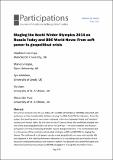Files in this item
Staging the Sochi Winter Olympics 2014 on Russia Today and BBC World News : From soft power to geopolitical crisis
Item metadata
| dc.contributor.author | Hutchings, Stephen | |
| dc.contributor.author | Gillespie, Marie | |
| dc.contributor.author | Yablokov, Ilya | |
| dc.contributor.author | Lvov, Ilia | |
| dc.contributor.author | Voss, Alexander | |
| dc.date.accessioned | 2015-07-10T14:10:03Z | |
| dc.date.available | 2015-07-10T14:10:03Z | |
| dc.date.issued | 2015-05 | |
| dc.identifier | 192235216 | |
| dc.identifier | 6fe639d7-1ad2-4950-ad16-ffbbbc5faffa | |
| dc.identifier.citation | Hutchings , S , Gillespie , M , Yablokov , I , Lvov , I & Voss , A 2015 , ' Staging the Sochi Winter Olympics 2014 on Russia Today and BBC World News : From soft power to geopolitical crisis ' , Participations: Journal of Audience Reception Studies , vol. 12 , no. 1 , pp. 630-658 . | en |
| dc.identifier.issn | 1749-8716 | |
| dc.identifier.other | Bibtex: urn:210c342b85eb88af2539889a64bb9148 | |
| dc.identifier.other | ORCID: /0000-0002-8053-2175/work/31093296 | |
| dc.identifier.uri | https://hdl.handle.net/10023/6967 | |
| dc.description.abstract | This article compares how Russia Today (RT) and BBC World News (BBCWN) interacted with audiences on their social media platforms during the 2014 Sochi Winter Olympics. From the outset, the sporting events were overshadowed by tensions between Russia and ‘western’ nations over human rights. By the time the Sochi Games closed, the world had plunged into one of the gravest geopolitical crises since the Cold War – the confrontation over Russia’s annexation of Crimea, following dramatic regime change in Ukraine. This confrontation led to a disruption of the carefully orchestrated strategies of RT and BBCWN for staging the Games. The collision of a soft power spectacle and geopolitical crisis was most acutely felt and apparent at the interface between international broadcasting and social media where dissonant and dissenting discursive regimes clashed. This geopolitical standoff brought prior international tensions to a head as BBCWN struggled to manage the transition from a celebratory global media event to a geopolitical crisis. Unimpeded by established media conventions, RT’s approach to the transition was to attack and repudiate ‘western’ media and political discourses. RT, while loathed and despised in western media circles as a crude propagandistic news channel, has proved to be particularly adept in its uses of social media at times of global political events. The article sheds light on RT’s appeal to international audiences interested in counter-hegemonic assaults on ‘western’ media and political debate, and suggests directions for future research. It argues that RT thrives in a 24-hour news environment in which global crises become subject to rumours, counter-rumours and unverified accounts superseding one another in a cauldron of conflicting information and unanswered questions - fertile territory for RT’s conspiratorial ethos. | |
| dc.format.extent | 29 | |
| dc.format.extent | 1208450 | |
| dc.language.iso | eng | |
| dc.relation.ispartof | Participations: Journal of Audience Reception Studies | en |
| dc.subject | Sochi Olympics 2014 | en |
| dc.subject | International broadcasting and social media | en |
| dc.subject | Soft power | en |
| dc.subject | Russia Today | en |
| dc.subject | BBC World News | en |
| dc.subject | QA75 Electronic computers. Computer science | en |
| dc.subject | H Social Sciences | en |
| dc.subject | JZ International relations | en |
| dc.subject | NDAS | en |
| dc.subject.lcc | QA75 | en |
| dc.subject.lcc | H | en |
| dc.subject.lcc | JZ | en |
| dc.title | Staging the Sochi Winter Olympics 2014 on Russia Today and BBC World News : From soft power to geopolitical crisis | en |
| dc.type | Journal article | en |
| dc.contributor.institution | University of St Andrews. School of Computer Science | en |
| dc.description.status | Peer reviewed | en |
| dc.identifier.url | http://www.participations.org/Volume%2012/Issue%201/35.pdf | en |
This item appears in the following Collection(s)
Items in the St Andrews Research Repository are protected by copyright, with all rights reserved, unless otherwise indicated.

